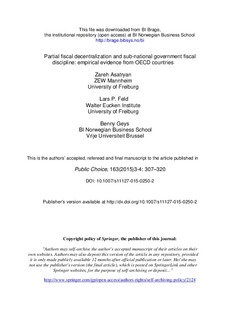| dc.contributor.author | Asatryan, Zareh | |
| dc.contributor.author | Feld, Lars P. | |
| dc.contributor.author | Geys, Benny | |
| dc.date.accessioned | 2015-05-30T08:11:50Z | |
| dc.date.accessioned | 2015-07-23T12:39:35Z | |
| dc.date.available | 2015-05-30T08:11:50Z | |
| dc.date.available | 2015-07-23T12:39:35Z | |
| dc.date.issued | 2015 | |
| dc.identifier.citation | Public Choice 2015, 163(3-4):307-320 | nb_NO |
| dc.identifier.issn | 0048-5829 | |
| dc.identifier.issn | 1573-7101 | |
| dc.identifier.uri | http://hdl.handle.net/11250/293522 | |
| dc.description | This is the authors' accepted and refereed manuscript to the article | nb_NO |
| dc.description.abstract | Recent theoretical research suggests that financing sub-national governments’ expenditure out of own revenue sources is linked to more responsible budgeting, because the financial implications of spending decisions then are internalized within a jurisdiction. We test this proposition empirically on a sample of 23 OECD countries over the 1975–2000 period, and find evidence in line with the hypothesis that greater revenue decentralization (measured as sub-national governments’ share of own source tax revenues in general government tax revenue) is associated with improved sub-national government budget deficits/surpluses. This finding is cross-validated with a novel, independent dataset consisting of all 34 OECD member states from 2002 to 2008. | nb_NO |
| dc.language.iso | eng | nb_NO |
| dc.publisher | Springer | nb_NO |
| dc.title | Partial Fiscal Decentralization and Subnational Government Fiscal Discipline: Empirical Evidence from OECD Countries | nb_NO |
| dc.type | Journal article | nb_NO |
| dc.type | Peer reviewed | nb_NO |
| dc.date.updated | 2015-05-30T08:11:50Z | |
| dc.source.journal | Public Choice | nb_NO |
| dc.identifier.doi | 10.1007/s11127-015-0250-2 | |
| dc.identifier.cristin | 1233694 | |
| dc.description.localcode | 1, Forfatterversjon | nb_NO |
